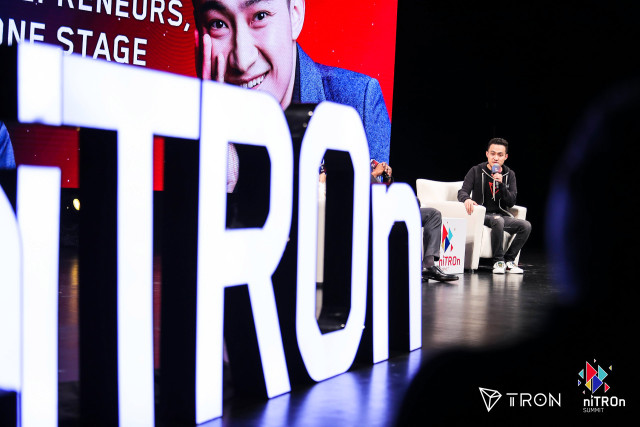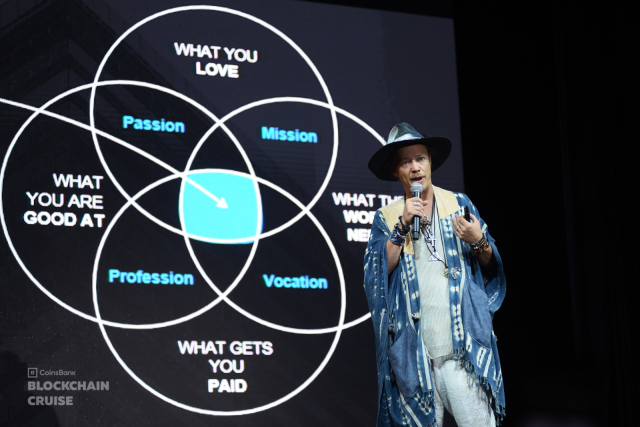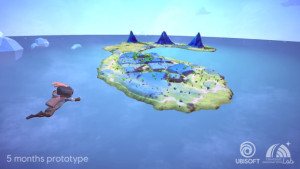In January, basketball legend Kobe Bryant shared the stage with 28-year-old Tron CEO Justin Sun at the glitzy NiTROn Summit in San Francisco, where Sun’s blockchain-based cryptocurrency company entertained more than 1,000 attendees at its first-ever developer conference.
Beauty pageant winners held the doors at the Yerba Buena Center for the Arts Theater, where Apple’s Steve Jobs regularly unveiled new iPhones and Macs. Bryant, a two-time Olympic gold medalist, five-time NBA champion, and one of the best career players of all time, was on hand to talk about entrepreneurship and his post-basketball life as a venture capitalist. His $100 million firm, Bryant Stibel, focuses on media, tech, and gaming, with investments in companies like The Players Tribune, a sports website, and Scopely, a mobile-game publisher.
The posh setting, the beauties, and Kobe were no accident. Tron, just a little more than a year old, was sending a clear message: we’re here to win, and we have a way to take crypto to the masses—games. Sun touted a recently announced $100 million fund to convince developers to make games on top of Tron, which Sun said was critical to mass adoption of blockchain-based gaming.
“The trust inside the community is very important for cryptocurrency and blockchain to grow. That’s a huge difference between running a company and being part of the community in the crypto environment,” Sun said in an interview backstage. “A company just delivers a product and people like it or don’t like it. But in the crypto community, you depend on that community to build up your environment and develop your apps. You need that developer community to make your product better.”
Tron, just a little more than a year old, was sending a clear message: we’re here to win, and we have a way to take crypto to the masses—games.
Sun is a Chinese serial entrepreneur and the founder of Peiwo, a mobile social networking company. Sun started Tron to create a blockchain-based open-source protocol with distributed storage technology aimed at the digital entertainment industry; it raised $58 million in an initial coin offering (ICO) in September 2017. The value of Tron’s cryptocurrency and utility token, TRX, shot up to nearly $20 billion, but has since slid to $1.7 billion, according to CoinMarketcap.
That could have been the end of Tron. But Sun proved to be more resourceful than many of the thousands of companies that raised money in ICOs—80 percent of which were ultimately labeled scams—but were wiped out in a crypto winter that destroyed much of the newfound wealth. In July 2018, before crypto prices plummeted, Sun acquired BitTorrent, the 15-year-old file-sharing company and one of the biggest decentralized networks in existence, for a reported $140 million. BitTorrent has 25 million daily users, and if even a small percentage of them get hooked on Tron’s tokens, that will be a sizable audience for Tron’s developers (though questions have been raised about whether Tron can handle the transaction volume).
Nevertheless, the possibility of Tron’s ecosystem has attracted more than 3,000 developers in its Discord group, and Sun says that more than 2,000 apps could debut this year. Three to five Tron-based games are debuting every day.
Justin Sun

So far, the titles are simple mobile or web games with unimpressive graphics and crude mechanics related to collecting Tron’s cryptocurrency rewards. Traditional developers may belittle these games, but it is worth remembering that people said the same thing of FarmVille, before it became huge on social and turned Zynga into a multibillion-dollar company.
“It’s like the early days of the App Store,” Sun said. “Once you had games like Angry Birds and Fruit Ninja, a lot more came out after. In more recent years, you had PUBG, and then battle royale games became really popular on different platforms. 2019 will be the year for games.”
Empowering gamers and developers
Sun is not alone in believing that games will pave the road to mass adoption of crypto and an online utopia where no central authority will govern society or the internet.
That’s a grand vision, but on a more practical level, blockchain has the potential to put a lot of power back in the hands of gamers and developers. Today, big game publishers are like media and entertainment titans who own the worlds, characters, and franchises of gaming; if your game shuts down, you lose your characters and your investment. In a decentralized blockchain world, users could own their own characters, not merely rent them as they do with today’s onerous end-user license agreements. With blockchain, each character’s ownership can be designated and identified. You could take a character from one game to another, or trade it for something else of value.
Developers are empowered as well. Rather than go through publishers, developers can directly publish their games in app stores that won’t keep a huge chunk of the money. The app stores on mobile and social disrupted physical retail stores, but the revolution didn’t really go far enough. Game industry veterans venturing into crypto see blockchain as a way to disrupt the status quo. And some of them are racing to get ahead of Sun.
EOS is also trying to entice game developers to its cryptocurrency platform. Controversial “blockchain billionaire” Brock Pierce said he was considering starting a fund for game companies to build apps on EOS, which Pierce cofounded and later left.
People said the same thing of FarmVille, before it became huge on social and turned Zynga into a multibillion-dollar company.
“If I were a game developer right now, I would be looking at building something on EOS,” Pierce said in an interview. “I almost don’t want to be telling people because this is literally like when Facebook opened up their APIs. This is Zynga all over again. It’s one of the greatest opportunities I’m aware of in my space, one of the greatest opportunities I’m aware of in the world.”
Pierce said that up until very recently, blockchain wasn’t ready to support gaming. “For five years, I’ve told people, ‘Nope, not ready.’ But now it’s possible. You can build stuff on EOS today, and there will be other chains in the future.”
Toward a better Metaverse
One of the shared dreams of blockchain-based game makers is to create cross-platform digital items, such as characters or weapons, that can be transported from one game to another once they’re bought or created.
Philip Rosedale, CEO of virtual reality world firm High Fidelity, and game developer Ed Annunziata of Playchemy are separately hoping to enable characters to be moved across worlds.
“The two simplest things that need to be open to make the Metaverse the most useful it can be for humans are identity — that is, Dean can come to my server for a meeting and prove that he’s Dean,” Rosedale told VentureBeat in 2017. “You should be able to do that in a way that’s blockchain-based, never violates your privacy unless you want to … and works across multiple virtual worlds. The other thing that needs to move across virtual worlds is digital assets, like the clothes you wear.”
Annunziata wants to allow players to take their own creations in virtual worlds and move them to other worlds, particularly if one world shuts down. No longer would game companies own the assets and simply let the players use them. The blockchain could authenticate ownership of the avatars or merchandise, so no one could copy or steal your items.
Disrupting the app stores
While Robot Cache isn’t the first blockchain game startup, it has a famous game developer behind it: Brian Fargo, founder of pioneering fantasy game publisher Interplay, which developed “Wasteland,” and InXile Entertainment. One of Robot Cache’s goals is to disrupt the PC gaming app store, Steam, which takes a 30 percent cut from all transactions.
Fargo has proposed creating a store that took only a 5 percent cut, with 95 percent going to the publisher or developer. Robot Cache would also use blockchain to verify digital copies so that gamers could resell their games a single time—something that’s never been possible before. In that case, Robot Cache would still keep 5 percent, the gamer would keep 25 percent, and the developer would get 70 percent, or about as much as they got on Steam, which did not enable resales at all. Fargo says decentralized payments could shorten the time it takes to pay developers whose games were sold in the store. If developers were paid in a cryptocurrency, the transfer of funds could take place in a matter of hours, not days or months.
That scenario may be ideal, but it isn’t yet a reality. As the SEC starting cracking down on coin offerings, Robot Cache backed off on a crypto ICO. Developers preferred to be paid in fiat currency, CEO Lee Jacobson said in an interview. So the company switched its payment system from cryptocurrency to an ordinary virtual currency; players can buy coins to spend in the game, and developers are paid in dollars. That’s all good, as Jacobson noted that cryptocurrency prices have cratered. Players can still earn Iron virtual currency via mining and use it to purchase games. Digital resales still happen on the blockchain.
Brock Pierce, courtesy of CoinsBank

Despite the hiccups, the notion of keeping more of the proceeds has ultimately proven powerful for developers. Robot Cache announced 10 publishers in March 2018—though it wasn’t easy to convince them initially. “We talked about our digital resale model, and then next question we got was ‘What is blockchain?’” Jacobson says. “That was just nine months ago. A lot of education had to happen.”
It was also challenging to get the technology done. Robot Cache had to create its own publisher portal to enable game companies to upload their games to the store, which Jacobson says was a lot of complexity to tackle.
“What we had to do was find a way to make it simple for gamers,” Jacobson says. “It was really hard to get the user experience right. Nobody had written a proper ownership license that lived along with a piece of content. It was a difficult process.”
Robot Cache announced in December 2018 that it had signed up 22 publishers with 700 games to launch in its blockchain app store. The store is expected to debut in 2019, with publishers including 1C Publishing, Bigben Interactive, Ci Games, Dankie, Devolver Digital, Headup, Hyperkinetic Studios, Imgn.pro, Libredia, Playdius Games/Plug In Digital, Revival Productions, and Running with Scissors.
While those are interesting indie game makers and publishers, they’re not the biggest companies in gaming. To get those companies, Robot Cache faces a chicken-and-egg problem. But it has already had an effect. Epic Games, Kartridge, and Discord recently announced digital game stores that will take a smaller cut (less than 30 percent) of the revenue pie, leaving most of it for developers.
“Because of the disruptive nature of what we are doing and the 5 percent share, we are talking to everybody,” Jacobson says. “I think they’ve all validated that you don’t need a 30 percent cut to run a store.”
The next challenge is getting users to to transition to a brand new store when they’re already familiar with Steam or GOG. It will require an advertising and marketing budget and strategy. Robot Cache hopes the games will be its main attraction, but its store will be tiny compared to the legacy options. And Steam owner Valve can always launch a counterattack by reducing the percentage of revenue that it keeps.
Mainstream competition
Blockchain startups also have competition from established game makers. Ubisoft, the French video game publisher with 14,000 employees, is one of them.
The ultimate goal: Metaverse, the virtual universe envisioned by Neal Stephenson in his 1997 novel Snow Crash.
The maker of games like “Assassin’s Creed: Odyssey” recently sponsored a Blockchain Game Summit in Lyon, France, and it is experimenting with various blockchain games.
“Obviously we’re very interested in blockchain. We’re exploring that here with various products,” Catherine Seys, startup program director at Ubisoft’s Strategic Innovation Lab, said last year. Seys said Ubisoft isn’t focused so much on crypto, which often involves rewards for gamers. Rather, it’s looking at the value of digital assets and how they can be used in environments where Ubisoft builds part of the world and users build part of it.
The company is searching for ways to enhance the user experience with blockchain, and created an experimental game, Hashcraft. It also held a blockchain hackathon at its Strategic Innovation Lab in Paris.

But so far, there isn’t much blockchain-related coming out of other big companies like Electronic Arts and Activision Blizzard, which haven’t even truly embraced augmented reality or virtual reality, tech from a couple of hype cycles ago.
At the Tron event, Jared Psigoda, the founder of blockchain game platform Bitguild (a Tron partner), joked, “In a few years, maybe we’ll buy them.”
The decentralized internet
Tim Sweeney, CEO of Epic Games, has said that blockchain could be the underlying technology for the Metaverse, the virtual universe envisioned by Neal Stephenson in his 1997 novel Snow Crash. In 2017, Sweeney said that to be used for gaming, Ethereum had to be updated to refresh rates of 60 times a second to run simulation code for games. By 2018, Epic Games had opened its own store, and made blockchain-related technologies available to game developers via its Unreal Game Engine.
“We’re getting players together from all platforms, especially, and bringing them together live for events,” Sweeney said in an interview. “But there are a lot of components missing there. There’s not a persistent universe, a single world everyone can participate in. It’s a problem we’ll all be groping toward over the next decade.”
Robot Cache’s Jacobson says he wants the game development community to keep sight of the main goal for any game.
“Developers will say, ‘Hey, man, we’re doing a blockchain game.’ But it could be a horrible game,” Jacobson says. “It’s got to be a good game before it’s a blockchain game.”
As for Sun, games could be a means to an end. He isn’t necessarily going to build the world of “Ready Player One.” But he does want to create what he calls the decentralized internet.
“We see ourselves as building a decentralized virtual world,” Sun said. “That’s why we want to put the BitTorrent protocol and the Tron protocol together … We can abandon today’s centralized services, like Facebook or Google. We can fully create a decentralized internet. That’s the hardest thing we’ll ever build. But I think it’s meaningful. The world needs an alternative.”
Get the BREAKERMAG newsletter, a weekly roundup of blockchain business and culture.